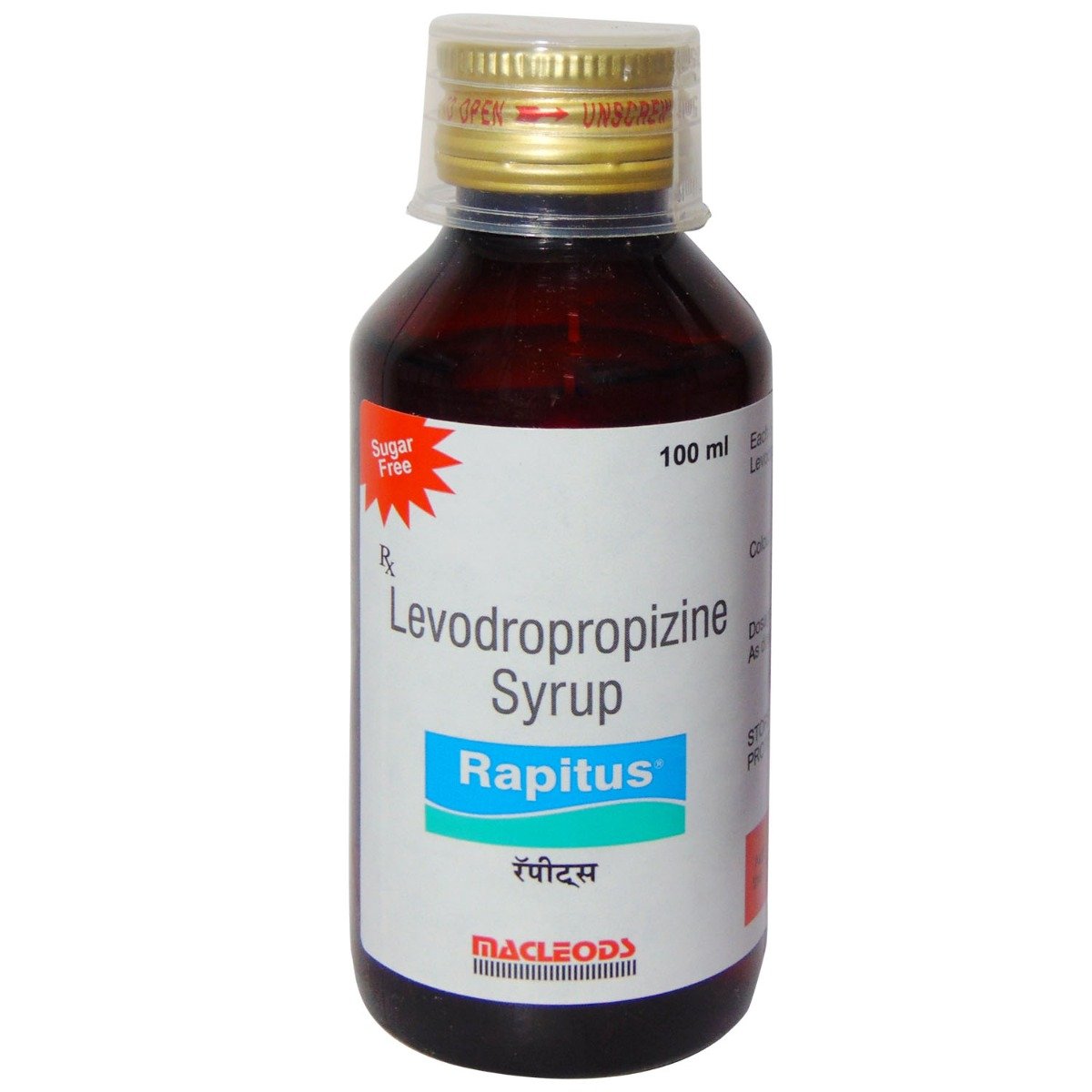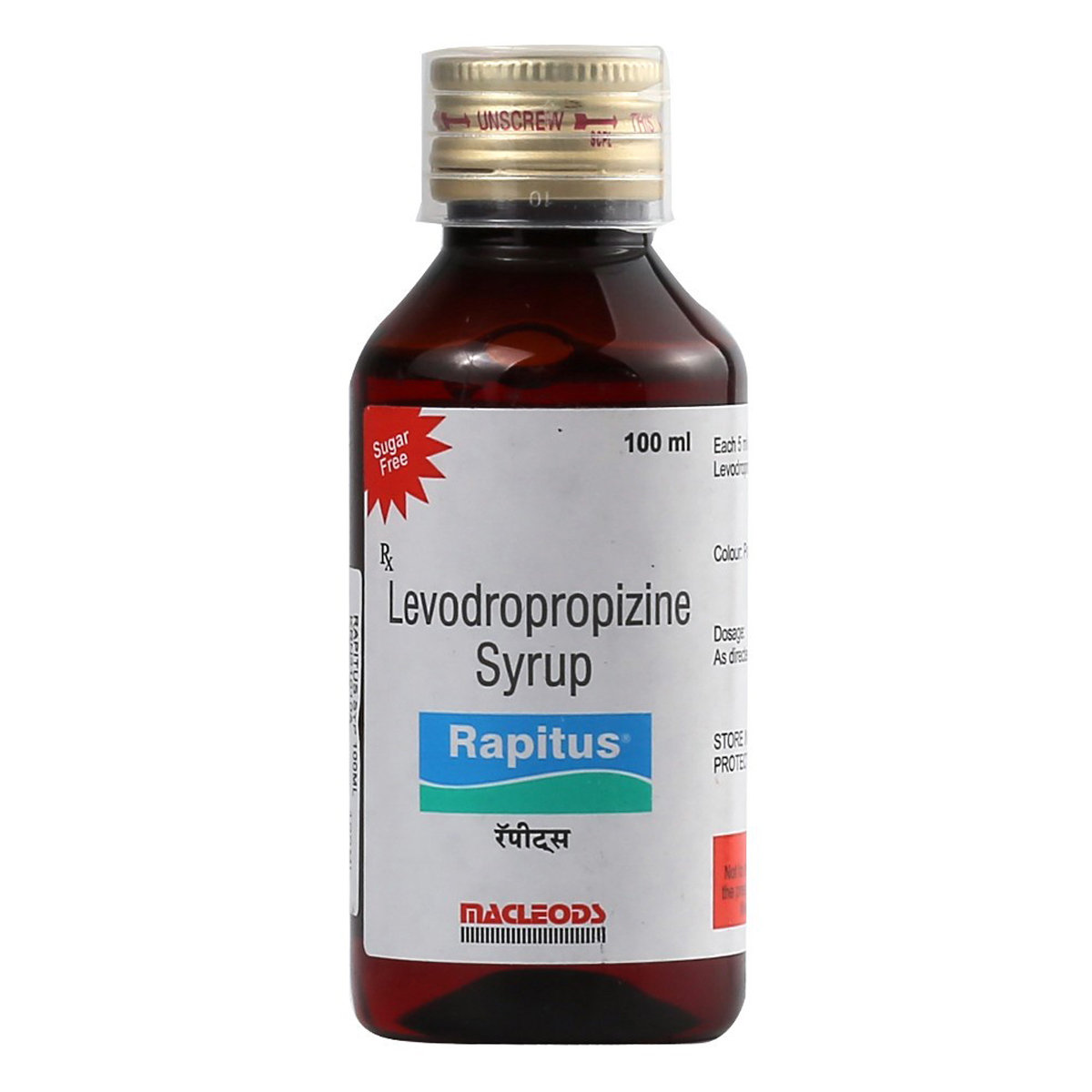Levodropropizine
About Levodropropizine
Levodropropizine is used to treat dry cough. Coughing (dry or productive) is the body’s way of clearing irritants (like allergens, mucus, or smoke) from airways and preventing infection. There are two types of coughs, namely: Dry cough and chesty cough. A dry cough is tickly and doesn't produce any vicious or thick mucus, while a chesty cough (wet cough) means mucous or sputum is produced to clear your airways.
Levodropropizine consists of Levodropropizine (cough suppressant) as its active ingredient, which belongs to the cough suppressant class and works by blocking the transmission of nerve signals from the cough centre in the brain.
Take Levodropropizine on an empty stomach, as advised by your doctor, with a measuring cup. Your doctor will recommend how often you take Levodropropizine based on your medical condition. Some people may experience dry mouth, drowsiness, vomiting, blurred vision, constipation, dizziness, or tiredness. Most of these side effects of Levodropropizine do not require medical attention and gradually resolve over time. However, if the side effects persist or worsen, please consult your doctor.
If you are allergic to Levodropropizine or any other medicines, please tell your doctor. If you are pregnant or breastfeeding, it is advised to inform your doctor before using Levodropropizine. Levodropropizine is not recommended for children below 2 years of age. If you have high blood pressure, fits, glaucoma, hyperthyroidism (overactive thyroid), chronic bronchitis, asthma, cough with mucus, cough caused by smoking, chronic bronchitis or emphysema (a lung condition causing shortness of breath), chronic obstructive pulmonary disease (COPD), blockage in stomach or intestines, phenylketonuria (a congenital disability that causes accumulation of amino acid, phenylalanine in the body), enlarged prostate, pheochromocytoma (tumour in the adrenal glands), kidney, liver, heart or urinary problems, inform your doctor before taking Levodropropizine.
Uses of Levodropropizine
• Cough Relief: Levodropropizine is commonly used to alleviate dry coughs and reduce throat irritation, providing soothing relief.
• Loosening Mucus: Levodropropizine may help in thinning and loosening mucus in the respiratory tracts, making it easier to expel during coughs.
• Cold Symptoms: Levodropropizine can be effective in relieving symptoms associated with the common cold, including coughing and throat discomfort.
• Soothing Irritated Airways: Levodropropizine can help soothe inflamed and irritated airways, making breathing more comfortable.
• Allergy-related Cough: Levodropropizine may also be beneficial for individuals experiencing cough due to allergies, providing symptomatic relief.
Medicinal Benefits
Levodropropizine consists of Levodropropizine, which belongs to the cough suppressants class and works by blocking the transmission of nerve signals from the cough centre in the brain to the muscles that produce cough, thereby decreasing the urge to cough. It is non-sedative in nature and does not induce sleepiness.
Directions for Use
- Levodropropizine can be taken on an empty stomach, or as advised by your doctor.
- Follow your doctor's instructions on the dosage and timing of this medication to ensure safety.
- Measure the prescribed dose of Levodropropizine using the measuring cup/dosing syringe provided with the pack and take it by mouth.
- Shake the bottle well before use.
Storage
Side Effects of Levodropropizine
- Dry mouth
- Drowsiness
- Vomiting
- Blurred vision
- Constipation
- Dizziness or tiredness.
Drug Warnings
If you are allergic to Levodropropizine or any other medicines, please tell your doctor. If you are pregnant or breastfeeding, it is advised to inform your doctor before using Levodropropizine. Levodropropizine is not recommended for children below 2 years of age. Drink plenty of fluids while taking Levodropropizine to loosen mucus and protect yourself from being dehydrated or overheated during exercise and in hot weather. If you have high blood pressure, fits, glaucoma, hyperthyroidism (overactive thyroid), chronic bronchitis, asthma, cough with mucus, cough caused by smoking, chronic bronchitis or emphysema (a lung condition causing shortness of breath), chronic obstructive pulmonary disease (COPD), blockage in stomach or intestines, phenylketonuria (a birth defect that causes accumulation of amino acid, phenylalanine in the body), enlarged prostate, pheochromocytoma (tumor in the adrenal glands), kidney, liver, heart or urinary problems, inform your doctor before taking Levodropropizine.
Drug Interactions
Drug-Drug Interaction: Levodropropizine may have interaction with anti-allergic drugs (diphenhydramine, cetirizine), cough suppressants (dextromethorphan), antidepressants (duloxetine, sertraline), narcotic analgesics (hydrocodone), and antianxiety drug (alprazolam).
Drug-Food Interaction: Levodropropizine may interact with alcohol. Therefore, avoid alcohol consumption with Levodropropizine as it may increase the risk of adverse effects such as drowsiness, dizziness, impairment in thinking or difficulty in concentrating.
Drug-Disease Interaction: If you have high blood pressure, fits, glaucoma, hyperthyroidism (overactive thyroid), chronic bronchitis, asthma, cough with mucus, cough caused by smoking, chronic bronchitis or emphysema (a lung condition causing shortness of breath), chronic obstructive pulmonary disease (COPD), blockage in stomach or intestines, phenylketonuria (a congenital disability that causes accumulation of amino acid, phenylalanine in the body), enlarged prostate, pheochromocytoma (tumour in the adrenal glands), kidney, liver, heart or urinary problems, inform your doctor before taking Levodropropizine.
Drug-Drug Interactions Checker List:
Safety Advice

Alcohol
unsafeAvoid consumption of alcohol with Levodropropizine as it may increase the adverse effects. Please consult a doctor before consuming alcohol with Levodropropizine.

Pregnancy
cautionThe safety of Levodropropizine in pregnant women is unknown. Therefore, it is given to pregnant women only if the doctor thinks the benefits outweigh the risks.

Breast Feeding
cautionLevodropropizine may be excreted in breast milk and cause harm to the baby. Therefore, Levodropropizine should not be used in breastfeeding mothers without a doctor’s advice.

Driving
cautionLevodropropizine may cause dizziness, drowsiness, blurred vision, or impair thinking in some people. Therefore, drive only if you are alert after taking Levodropropizine.

Liver
cautionTake Levodropropizine with caution, especially if you have a history of Liver diseases/conditions. The dose may be adjusted by your doctor as required.

Kidney
cautionTake Levodropropizine with caution, especially if you have a history of Kidney diseases/conditions. The dose may be adjusted by your doctor as required.

Children
cautionLevodropropizine is not recommended for children below 2 years of age. However, please consult a doctor before using Levodropropizine in children.
Habit Forming
Diet & Lifestyle Advise
Avoid dairy products such as milk as it may increase mucus production. Also, avoid processed or refined foods to have relief from cough. Instead replace baked foods, fried foods, white bread, white pasta, French fries, sugary desserts, and chips with green leafy vegetables.
Drink plenty of fluids to avoid dry throat while you have a cough and loosen mucus.
Avoid citrus fruits as it may worsen the cough. Eat fruits rich in water content such as pears, watermelon, peaches, and pineapples.
Special Advise
- Levodropropizine should not be used in people with airways problem (bronchorrhea) and reduced mucociliary function (Kartagener syndrome, ciliary dyskinesia) and children below 2 years of age.
Patients Concern
Disease/Condition Glossary
Cough: Coughing is the body’s way of clearing irritants (like allergens, mucus, or smoke) from airways and preventing infection. Coughs may be dry or productive. A productive cough (wet cough) brings up sputum (phlegm, mucus, and other matter) from the lungs. Cough is commonly caused as a response to allergy or viral infection, but coughing up mucus is possibly an indication of infection in the respiratory tract.
FAQs
Levodropropizine belongs to the class of medicines called cough suppressants used to treat dry cough.
Levodropropizine contains Levodropropizine, that belongs to the class of cough suppressants that works by decreasing the activity of the cough centre in the brain. Thus, decreases the urge to cough.
No, you are not recommended to consume alcohol with Levodropropizine as it may increase drowsiness. However, please consult a doctor before consuming alcohol with Levodropropizine.
You are recommended to avoid taking Levodropropizine if you have asthma, glaucoma, enlarged prostate, urinary problems, blockage in stomach or intestines. However, if you have any of these conditions, please inform your doctor before taking Levodropropizine.
Levodropropizine is not recommended for children below 2 years of age. However, Levodropropizine should be used with caution in children above 2 years if prescribed by a doctor as misuse of Levodropropizine in children may lead to serious adverse effects.
You are recommended to take Levodropropizine for as long as your doctor has prescribed it. However, if the symptoms persist or worsen with rash, fever, or persistent headache after 1 week of using Levodropropizine, please consult your doctor.
No, you are not recommended to stop taking Levodropropizine without consulting your doctor as it may worsen cough or cause recurring symptoms. Therefore, take Levodropropizine for as long as your doctor has prescribed it, and if you experience any difficulty while taking Levodropropizine, please consult your doctor.
The common side effects of Levodropropizine include dry mouth, drowsiness, vomiting, blurred vision, constipation, dizziness, and tiredness. If these side effects persist or worsen, please consult your doctor.
No, although Levodropropizine is a cough suppressant that can help reduce coughing, it won't treat the root cause of smoking-related coughs. While it may temporarily relieve symptoms, it is best to consult your doctor before using Levodropropizine for a cough caused by smoking.
No, Levodropropizine is not recommended for use in asthma management. It may help reduce coughing associated with respiratory conditions, but it does not address the underlying inflammation or bronchoconstriction (narrowing of the airways in the lungs) in asthma. Always consult your doctor before using Levodropropizine for asthma symptoms.
Yes, some people may experience sleepiness as a side effect of Levodropropizine. Avoid driving or using machinery if you feel sleepy after taking Levodropropizine. If the sleepiness continues, please consult your doctor.
You should take Levodropropizine for the duration prescribed by your doctor, based on the severity of your condition. Levodropropizine is generally recommended for 7 days, but if symptoms persist, please consult your doctor.
Yes, antibiotics can be taken alongside Levodropropizine if advised by the doctor, as there are no major interactions between them. However, it is always best to consult your doctor before taking them together.
Levodropropizine is generally not recommended for babies under 2 years of age. However, it can be used with caution in children over 2 years old if prescribed by a doctor.





